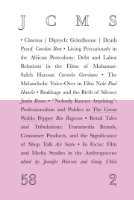
Cinemas d Amerique Latine
Scope & Guideline
Decoding the Cinematic Narratives of Latin America
Introduction
Aims and Scopes
- Exploration of Latin American Cinema History:
The journal extensively covers historical perspectives on Latin American cinema, analyzing significant movements, key filmmakers, and the evolution of film industries across different countries. - Cultural and Social Impact of Cinema:
It examines how cinema interacts with cultural identities, societal issues, and political contexts, often addressing themes such as colonialism, feminism, and social justice. - Interviews and Filmmaker Insights:
The journal features interviews with prominent filmmakers and industry figures, providing unique insights into their creative processes, challenges, and perspectives on the cinematic landscape. - Theoretical and Critical Analysis:
A strong emphasis is placed on critical theory and analytical frameworks that explore narrative structures, aesthetics, and audience reception within Latin American cinema. - Focus on Emerging Filmmakers and Genres:
The journal highlights the works of emerging filmmakers and new genres, particularly those that challenge traditional narratives and represent marginalized voices.
Trending and Emerging
- Videoactivism and Social Movements:
There is a growing interest in video activism and its role in social movements, reflecting the impact of digital media in shaping political narratives and civic engagement. - Gender Perspectives in Cinema:
A significant increase in discussions surrounding gender representation, particularly focusing on female directors and their contributions, highlights an emerging trend towards inclusivity and diversity in cinematic narratives. - Transnational Cinema Studies:
The exploration of transnational cinema, including cross-cultural influences and collaborations, has gained traction, indicating a shift towards understanding cinema in a globalized context. - Restoration and Preservation of Film Archives:
Recent themes emphasize the importance of restoring and preserving Latin American film archives, recognizing the cultural significance of historical films in contemporary discourse. - Thematic Exploration of Horror and Gothic Genres:
There is an emerging focus on horror and gothic genres within Latin American cinema, examining how these genres relate to cultural anxieties and societal issues.
Declining or Waning
- Traditional Cinema Narratives:
There has been a noticeable decrease in articles centered around traditional narratives and mainstream commercial cinema, suggesting a shift towards more experimental and avant-garde film practices. - Historical Documentaries:
Although historical documentaries have been a significant part of the journal's discourse, recent publications show a waning interest in this area, possibly as filmmakers explore more contemporary issues. - Focus on Specific National Cinemas:
The journal seems to be moving away from in-depth studies of specific national cinemas in favor of broader regional or transnational analyses, indicating a decline in localized studies.
Similar Journals

JCMS-Journal of Cinema and Media Studies
Unveiling the Power of Visual StorytellingJCMS-Journal of Cinema and Media Studies, published by University of Texas Press, stands as a vital platform for scholars and practitioners in the realms of cinema, media, and visual arts. With an ISSN of 2578-4900 and an E-ISSN of 2578-4919, the journal has been a part of the academic landscape since its inception in 2018 and will continue to contribute valuable research until 2024. Notably ranked in the top tiers of Scopus, securing Q1 status in Visual Arts and Performing Arts and Q3 in Communication, JCMS features articles that critically engage with both traditional and contemporary issues in media studies. Located in the United States, the journal is committed to providing open access to a wide array of interdisciplinary research, fostering dialogue among researchers, students, and media professionals. By serving as a nexus for innovative scholarship and creative discourse, JCMS enriches our understanding of cinematic and media practices and their impact on society today.

Transnational Screens
Navigating the Dynamic Intersections of Art and CommunicationTransnational Screens is a premier academic journal published by Taylor & Francis Ltd, focusing on the dynamic intersections of visual arts, performing arts, and communication in a globalized context. Since its inception, the journal has garnered significant recognition, featuring in the Q1 category for Visual Arts and Performing Arts and Q3 for Communication as of 2023, reflecting its influential contributions to these fields. With a Scopus ranking placing it in the 78th percentile in Visual Arts and Performing Arts, this journal serves as a vital platform for researchers, professionals, and students aiming to explore the implications of transnational narratives in contemporary media and artistic practices. The journal is accessible to a diverse readership and promotes open dialogue through its commitment to publishing innovative and interdisciplinary research from 2020 to 2024. As a key resource for understanding the complexities of transnational screens, it invites submissions that push the boundaries of traditional scholarship and engage with pressing global issues through the lens of the visual and performing arts.

Asian Cinema
Celebrating the Vibrancy of Asian Cinema through ResearchAsian Cinema is a distinguished academic journal dedicated to exploring the vibrant landscape of cinema across Asia, published by INTELLECT LTD, a recognized name in scholarly publishing. With its ISSN 1059-440X and E-ISSN 2049-6710, this journal has carved a niche within the realms of Communication and Visual Arts and Performing Arts, holding a 2023 Q4 ranking in Communication and a more favorable Q2 ranking in Visual Arts and Performing Arts. Operating out of the UK, specifically at THE MILL, PARNALL RD, BRISTOL BS16 3JG, ENGLAND, Asian Cinema provides a platform for interdisciplinary dialogues, critiques, and analyses that contribute significantly to the understanding of cinema as a cultural artifact. Acknowledged for its robust contribution to scholarly research, the journal commands a Scopus rank of 151 out of 667 in Visual Arts and Performing Arts, placing it in the 77th percentile, while achieving a 366 out of 511 rank in Communication, reflecting its ongoing relevance in the field. Although it operates under a traditional access model, Asian Cinema remains vital for researchers, professionals, and students alike, enriching academic discourse and providing valuable insights into the rapidly evolving cinematic practices across Asia.

CINEFORUM
Unveiling New Perspectives in Cinema and PerformanceCINEFORUM is a distinguished journal published by the FEDERAZIONE ITALIANA CINEFORUM, focusing on the vibrant field of Visual Arts and Performing Arts. With an ISSN of 0009-7039, this journal serves as a significant platform for researchers and practitioners interested in critical discussions and analyses pertaining to cinema and performance. Although coverage in Scopus discontinued in 2020, CINEFORUM has established its standing with a category ranking in the Q4 quartile for Visual Arts, reflecting its niche yet passionate readership in the arts community. Based in Bergamo, Italy, the journal aims to foster a deeper understanding of cinematic and performative texts, offering insights and scholarly contributions that enhance the discourse within these artistic domains. Catering to an audience that includes researchers, professionals, and students, CINEFORUM remains an essential resource for those looking to explore the intersection of theory and practice in cinema and performing arts.

CINEJ Cinema Journal
Fostering Interdisciplinary Insights into Film.CINEJ Cinema Journal, published by the University of Pittsburgh Library System, stands as a pivotal platform for scholarly discourse in the dynamic field of cinema studies. With an ISSN of 2159-2411 and an E-ISSN of 2158-8724, this Open Access journal has been dedicated to disseminating high-quality research since its inception in 2011. CINEJ provides an essential resource for researchers, practitioners, and students alike, exploring varied dimensions of cinema, including its cultural, historical, and technological implications. The journal is committed to fostering interdisciplinary dialogue, making it a vital asset for those seeking to deepen their understanding of cinema as an art form and social phenomenon. By engaging with contemporary issues and trends in the cinematic landscape, CINEJ encourages contributions that illuminate the intersection of film and social inquiry, ensuring its relevance in today’s academic ecosystem.

Studies in Russian and Soviet Cinema
Cultivating Insights into Cinematic Practices and CulturesStudies in Russian and Soviet Cinema, published by Routledge Journals, Taylor & Francis Ltd, provides a critical forum for the exploration and analysis of cinematic practices, histories, and cultures from the Russian and Soviet eras. With its ISSN 1750-3132 and E-ISSN 1750-3140, this journal operates under the editorial guidance of leading scholars in the field, making significant contributions to the Visual Arts and Performing Arts and Communication categories, where it is ranked in the upper quartiles of its peer group. The journal spans a rich period of study, converging insights from 2006 to 2024, thereby allowing for an in-depth understanding of the evolution and impact of cinema in societal narratives. Researchers and enthusiasts alike will appreciate its dedication to illuminating the often-neglected cinematic treasures of Russia and the Soviet Union, promoting scholarly discourse through its rigorous analyses and diverse range of articles. This journal serves as an essential resource for anyone interested in the intersections of film, culture, and history.

MILLENNIUM FILM JOURNAL
Exploring the Depths of Cinema's Cultural Tapestry.MILLENNIUM FILM JOURNAL, published by MILLENNIUM FILM WORKSHOP INC, stands as a pivotal platform for exploration and discourse within the realm of film studies. With its ISSN 1064-5586, the journal has been noteworthy in delineating the complexities of visual arts and performing arts, contributing significantly to academic scholarship between the years 2009 to 2016, and in 2018. Though its coverage has been discontinued in Scopus, the journal has attained a respectable position within its category, ranking #320 out of 502 in the Arts and Humanities field. Researchers, professionals, and students alike are invited to engage with interdisciplinary discussions that illuminate the cultural and theoretical dimensions of cinema. While currently not offering open access options, the journal continues to serve as a vital resource for those deeply invested in the study of film, making it a respected voice in visual arts and performance research.

Acta Literaria
Cultivating Insightful Analyses of Literary WorksActa Literaria is a distinguished journal published by the Universidad de Concepción, Facultad de Humanidades y Arte, focusing on the intricate domains of literature and literary theory. With an ISSN of 0717-6848, this Chilean journal has been a vital contributor to the scholarly discourse in its field since its inception in 2007. Although currently categorized in the Q4 quartile for the year 2023 and holding a Scopus rank of #860 out of 1106 in the Arts and Humanities section, Acta Literaria plays a crucial role in fostering dialogue and exploration among researchers, professionals, and students alike. The journal aims to facilitate the exchange of innovative ideas, critical analyses, and diverse perspectives on literature, making it an indispensable resource for anyone engaged in literary studies. While it does not offer open access, the journal's commitment to upholding academic rigor ensures that it remains a respected platform for scholarly publication.

Film History
Charting the dynamic relationship between film and society.Film History, published by Indiana University Press, is a premier academic journal that delves into the evolving landscape of cinema, illuminating the intricate interplay between historical narratives and film culture. With ISSN 0892-2160, and E-ISSN 1553-3905, this journal has established itself as a crucial resource for researchers, professionals, and students in the fields of history and visual arts. Recognized in the Q2 category for both History and Visual Arts and Performing Arts as of 2023, it boasts impressive Scopus rankings, securing #152 out of 667 in Visual Arts and Performing Arts, and #524 out of 1760 in History, placing it in the top 30th percentile. Although it does not currently offer open access options, the journal provides a wealth of scholarly articles that critically engage with film as a historical text, fostering a deeper understanding of its role in shaping societal narratives. Since its inception in 1987, Film History has been at the forefront of academic discourse, making it an invaluable resource for those seeking to explore the rich tapestry of cinematic history.

FILM QUARTERLY
Illuminating the Art of CinemaFilm Quarterly, published by University of California Press, stands as a leading academic journal in the field of visual arts and performing arts, boasting a prestigious Q1 ranking in the 2023 category quartiles. Since its inception in 1969, this quarterly publication has made significant contributions to the study and critique of cinema, attracting attention for its insightful articles, cutting-edge research, and comprehensive reviews that appeal to scholars, practitioners, and students alike. With an ISSN of 0015-1386 and an E-ISSN of 1533-8630, it serves as an essential resource for those seeking to enhance their understanding of film theory, history, and analysis. Although not open access, its articles are critical for researchers navigating the complex landscape of contemporary and historical film studies, underscoring its vital role in advancing scholarship within the discipline.